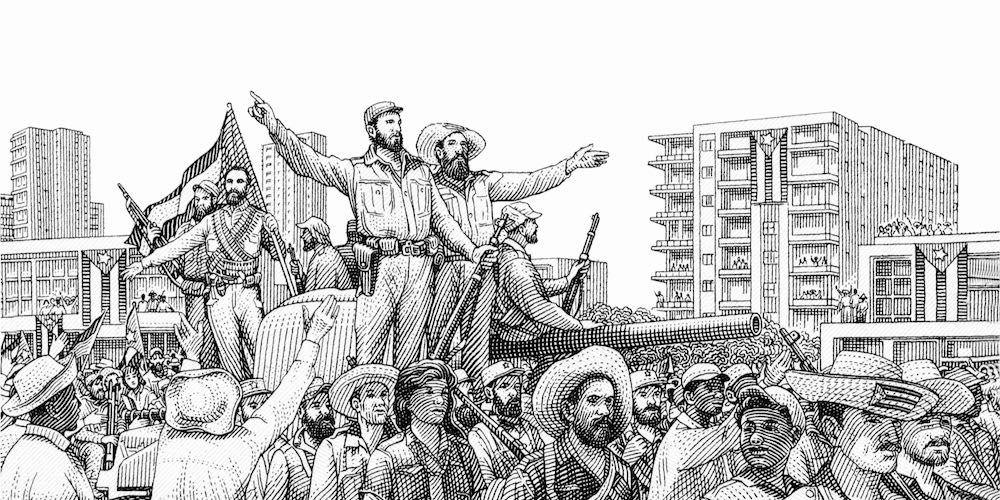The Ironic Revenge of Karl Marx
The ideas of Karl Marx suffer a double indignity: they have failed universally, and they have never been implemented. The first fact, rooted in the disasters of the bloody twentieth century, provides ample reasons to discredit Marx as a charlatan. The second fact provides neo-Marxist hopefuls with the gauzy promise of a truly Marxist revolution somewhere in the future.
It is unnecessary to rehearse the manifold crimes perpetrated in the name of communism. The sheer body count should be enough to quiet the voices of even the most devoted acolytes. Together, the suffering, the economic foolishness, and the political corruption provide adequate evidence that Marx’s scheme is a political fantasy that does little more than legitimize theft and murder.
However, according to Marx, a communist revolution cannot occur in a vacuum. Marx insisted that history can be reduced to a series of economic revolutions. Capitalism emerged in the wake of feudalism. Communism, in its turn, will emerge as a response to a capitalist system where the inherent injustices have been fully realized. These injustices are rooted in disparate allocations of capital. As capital becomes increasingly concentrated, the workers, who are bereft of property, will become increasingly desperate. Eventually the conditions of the workers will become intolerable and their revolutionary consciousness will be activated. Private capital will be abolished, the capitalists will be pushed aside, and the workers will establish a new world characterized by equality, justice, and universal happiness.
But consider where so-called communist revolutions occurred: Russia, China, Cambodia, and Cuba are, perhaps the most notable examples. None of these countries had a developed capitalist system that was then overturned by a communist revolution. They were, in various ways, feudal systems where, at best, capitalist means of production and property allocation existed only in embryonic form. In strictly Marxist terms, a communist revolution could not happen in these places. They needed a capitalist revolution before a communist revolution became an historic necessity. As such, communism, as envisioned by Marx, has not been tried. The revolutionaries jumped the historical gun and fabricated a communist revolution where a capitalist revolution was called for.
Today, however, much of the world has transitioned from feudalism to some form of free-market capitalism. As a result, this would seem to provide the Marxist hopefuls with a golden opportunity. And indeed, some of Marx’s worries about capitalism have, at least in part, materialized.
Marx understood that those who attempt to remain aloof from capitalist modes of production—what we call today “economies of scale”—tend to be consumed. As Marx puts it, “the middle class—the small tradespeople, shopkeepers, and retired tradesmen generally, the handicraftsmen and peasants—all these sink gradually into the proletariat, partly because their diminutive capital does not suffice for the scale on which Modern Industry is carried on, and is swamped in the competition with the large capitalists.”
As a result of the economic and political power of large-scale industry, property would be increasingly concentrated into fewer and fewer hands. The proletariat class would expand with the concentration of property. A decentralized economy comprised of small farms, artisans, and craftsmen is incompatible with an economy built around large-scale production, distribution, and consumption. Thus, “the bourgeoisie keeps more and more doing away with the scattered state of the population, of the means of production, and of property. It has agglomerated population, centralized means of production, and has concentrated property in a few hands. The necessary consequences of this was political centralization.” Marx understood that big business and big government arise in tandem, feed off each other, and perpetuate each other. He understood that the concentration of capital—which is to say economic power—would lead to a concentration of political power.
Marx’s solution is to abolish, via revolution, the entire economic system that makes such abuses and miseries possible. He sought to emancipate workers by emancipating society from private property. The proletarians, he writes, “have nothing of their own to secure and to fortify.” They have nothing to tie them to the current system, no incentive to improve their condition in the context of the capitalist structure. They will, according to Marx, have every incentive to destroy the system that has ground them down so ruthlessly. The revolution predicted by Marx is a revolution of the working class against their capitalist overlords. In the wake of this revolutionary upheaval, a new social existence will emerge in which private property (specifically private capital) will disappear, in which all are free to live according to their own desires and abilities, and in which each individual is equal to all others. The state would eventually wither away.
The communist revolution will never actually happen. Instead the property configurations that Marx thought would precipitate a communist revolution will continue to ossify and, ironically, those who hold the property and the power will make common cause with the disinherited masses.
As we survey our late-stage capitalist landscape, Marx’s predictions ring hollow even as some of the problems he identified have intensified. Where Marx predicted a communist revolution, we see instead the emergence of a class of plutocratic leaders who hold political, corporate, and cultural power with a relentless tenacity. At the same time, we increasingly hear the language of socialism with its moralistic assertions about equality and justice all wrapped up in the self-righteous vocabulary of the woke mob.
The plutocrats have no interest in a Marxist revolution that would destroy their hold on power, status, and wealth. They will do whatever they can to maintain their position even if that means spouting platitudes about equality, systemic injustice, and the need for a revolution. They will do whatever they can to appear sympathetic to the socialist demands of the masses. Government leaders will anxiously bequeath goods and services to the people as a show of solidarity with their socialist demands. The steadily expanding welfare state is an indicator of this dynamic as is the recent move to forgive student loans. Corporate leaders will trip over each other in their eagerness to appear sympathetic to the demands of the woke socialists. They will commit money, time, and resources to promote policies and procedures that insulate them from criticisms that they are beneficiaries of an unjust power structure. Of course, neither the politicians nor the corporate leaders will abandon their privileged positions in the name of socialism or equity. With a mixture of both fear and self-righteousness, they will tenaciously hold on to their positions while doling out enough platitudes and goodies to prevent the revolution from actually occurring.
This is Marx’s ironic revenge. The communist revolution will never actually happen. Instead the property configurations that Marx thought would precipitate a communist revolution will continue to ossify and—here’s the ironic part—those who hold the property and the power will make common cause with the disinherited masses. The anticipated adversarial relationship between the capitalist class and the working class will become increasingly shaped by a mutually beneficial arrangement. We can call it plutocratic socialism. The plutocrats will gain moral legitimacy by siding with the people via the socialist agitators. To do so plutocrats must convince themselves that their special virtue and status provide them with the unique opportunity to do important work on behalf of the oppressed, thereby legitimating their own relentless hold on wealth, status, and power. Socialist leaders gain, ironically, wealth, power, and status. The leadership of both classes have much to gain from this arrangement.
This hidden dynamic is one reason why socialist revolutions never come to a successful termination but instead remain stuck in a “transitional” phase where the plutocrats—and those fortunate individuals drawn into their orbit—secure the wealth, status, and power while the revolutionary energy of the masses is allowed to fester perpetually. The persistent frustration is kept from exploding by a steady trickle of goods and services that take the edge off the despair while fostering a habit of dependence.
Plutocratic Socialism represents the real-life conclusion to the Marxist fantasy. The plutocratic class—working in tandem with socialist agitators in the streets, educational institutions, and the media—is striving relentlessly toward this end where citizens are increasingly dependent and the power of their plutocratic masters is further entrenched. All that stands in the way of this radical agenda are middle class citizens who disdain both the servility of socialism and the insolent power of the plutocracy.
Anyone concerned about the future of freedom must work tirelessly to bolster and expand the middle class and middle-class property along with the middle-class virtues that property ownership helps to cultivate. The strength—indeed, the very survival—of freedom is fundamentally tied to the strength of the middle class.



